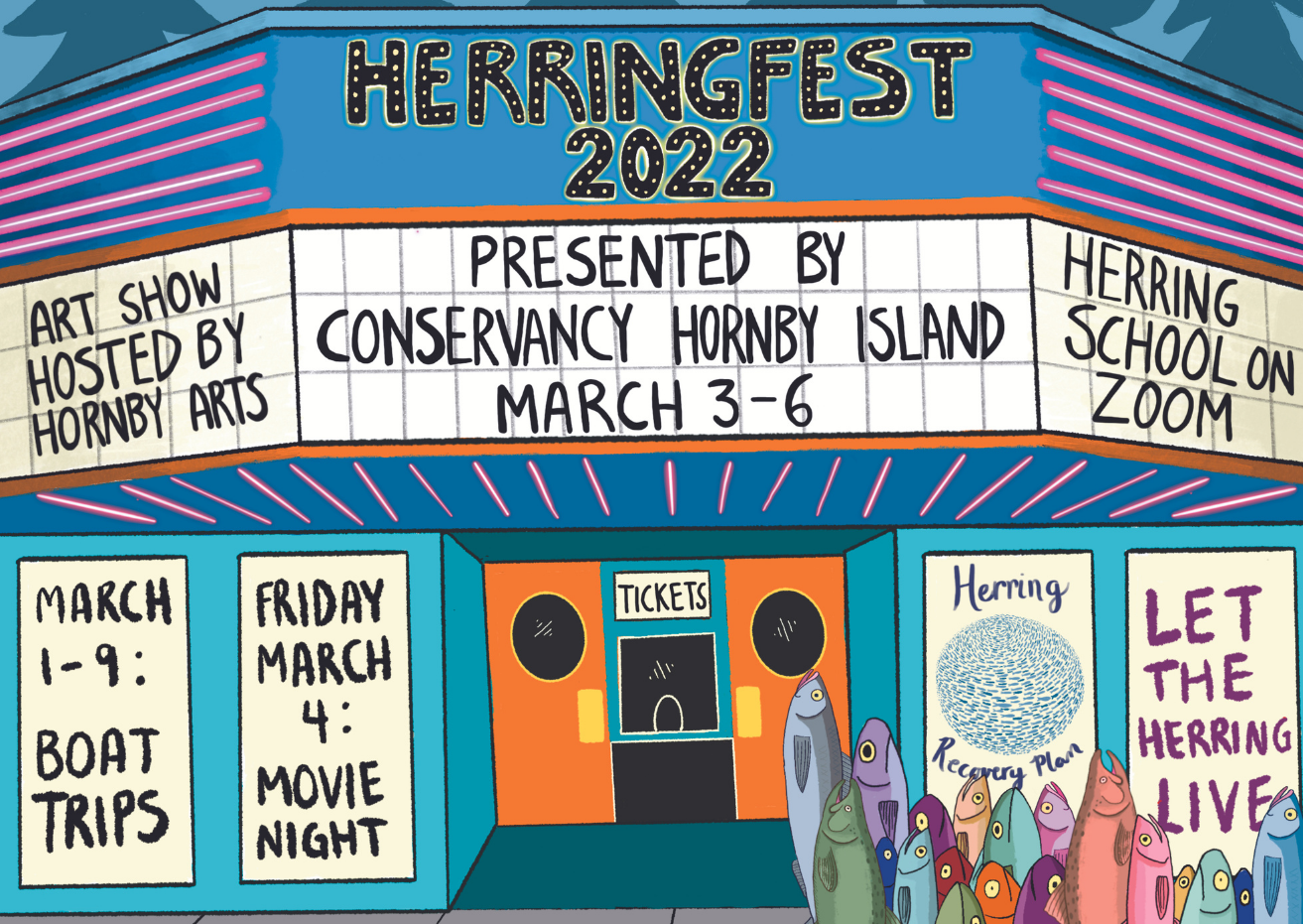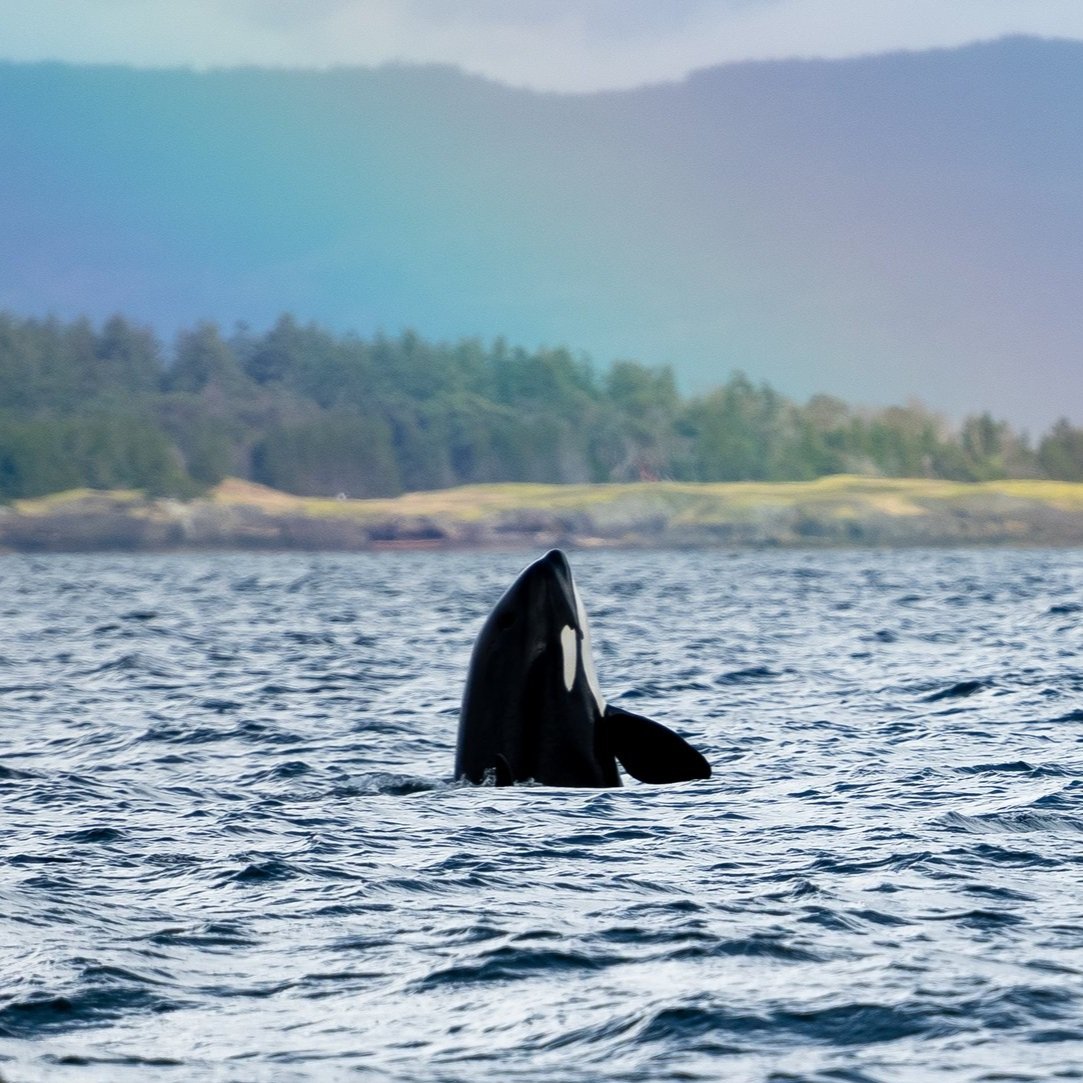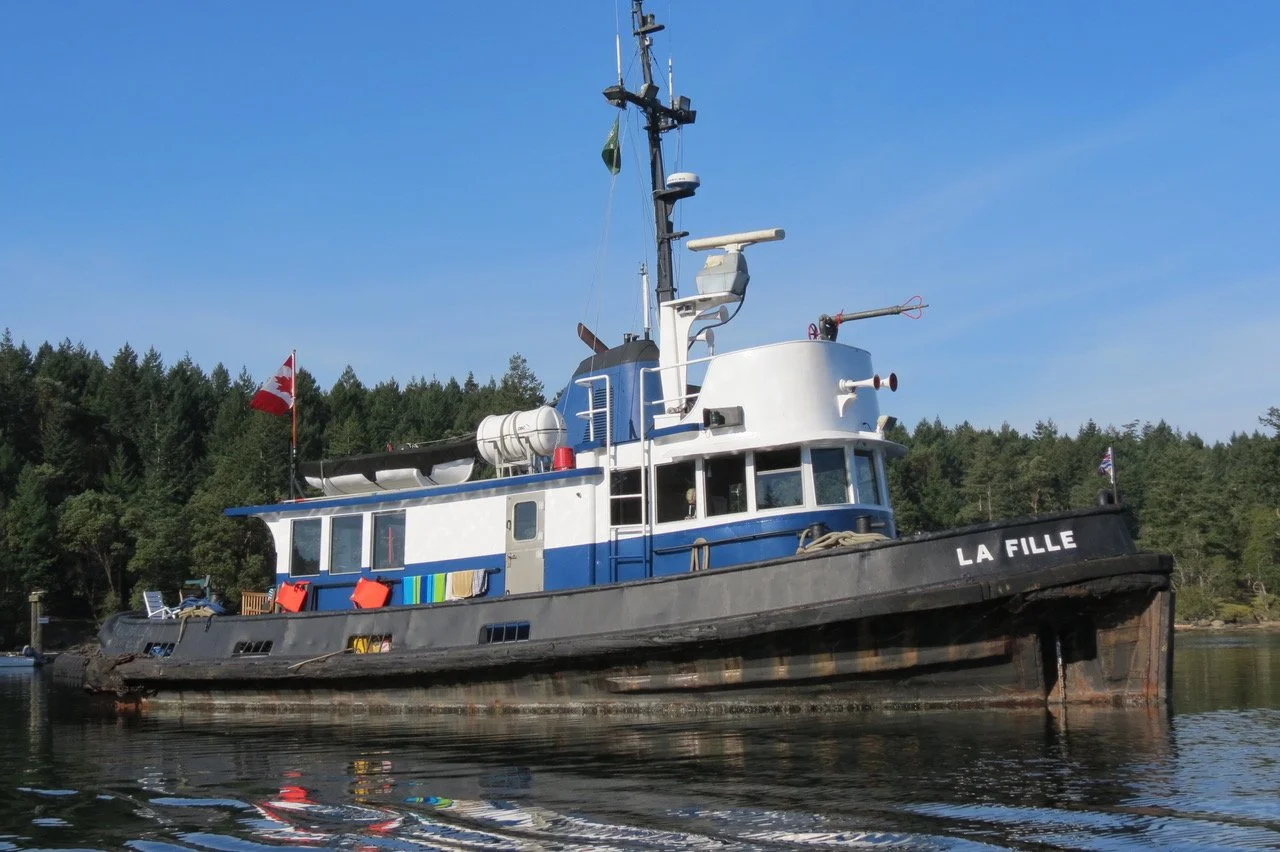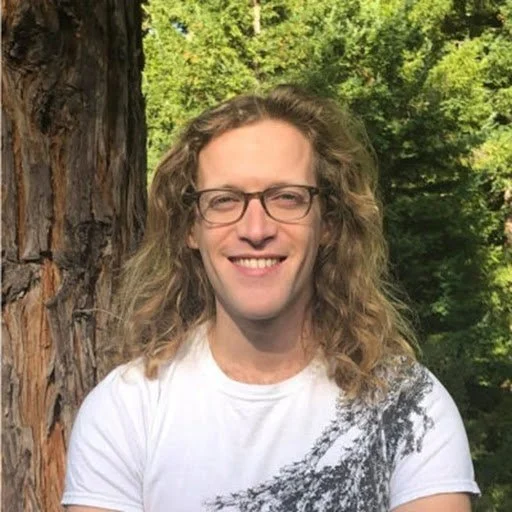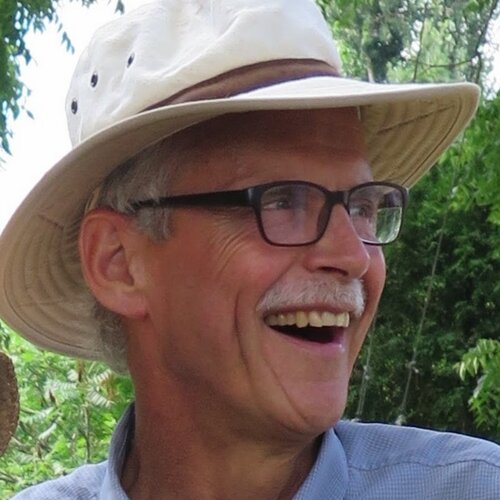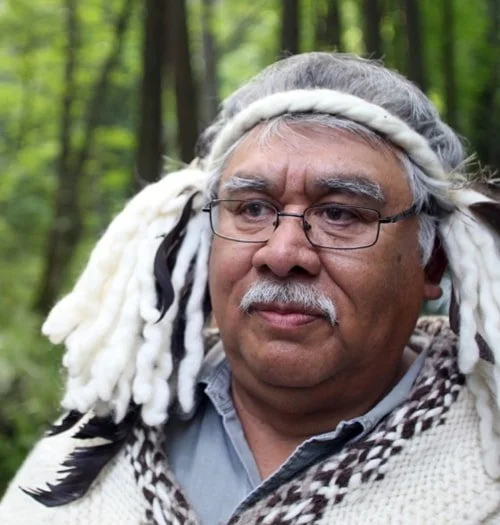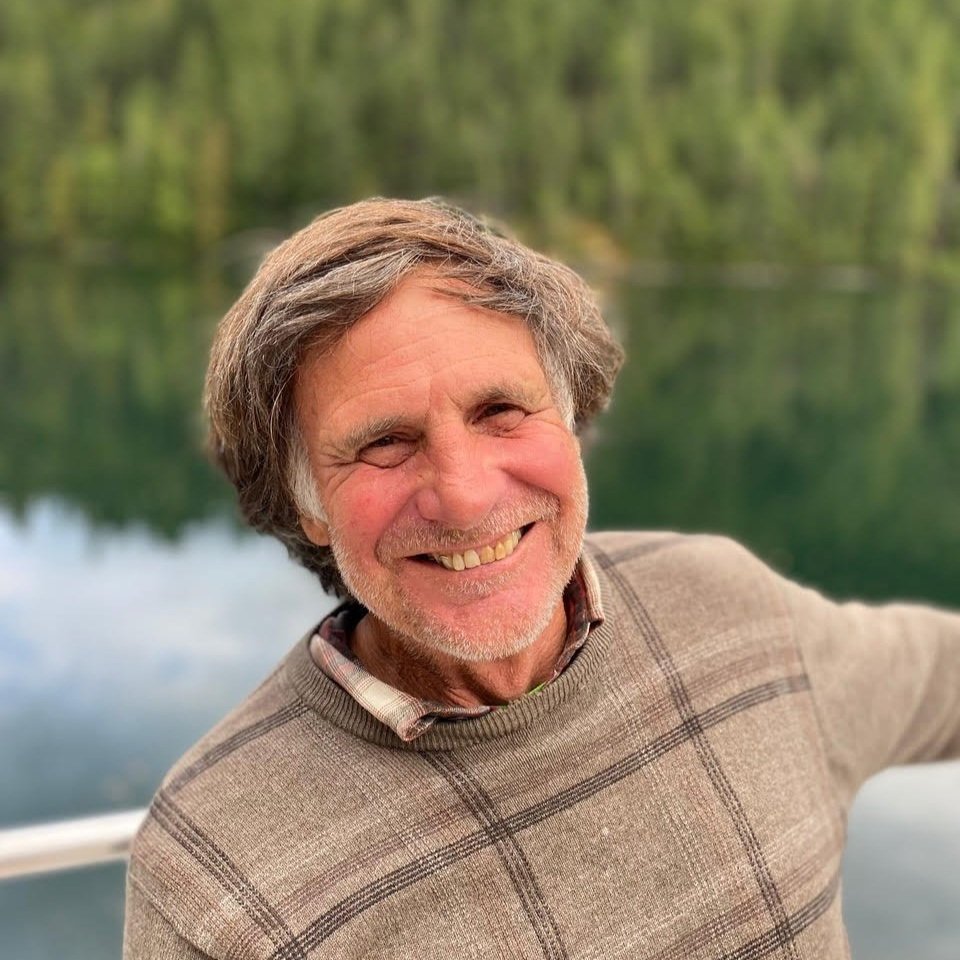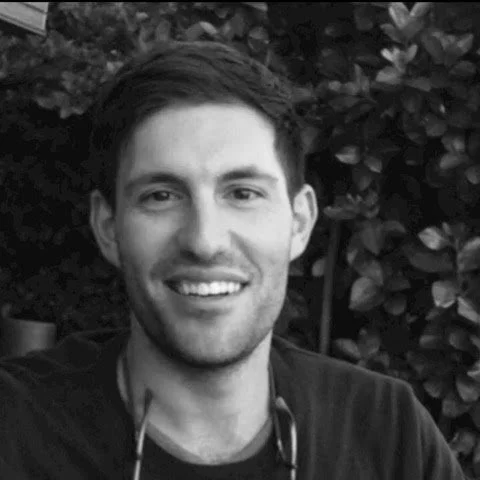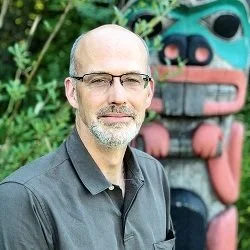THANK YOU FOR JOINING US FOR OUR 6TH ANNUAL
HERRINGFEST!
TICKETS & SCHEDULE
ART SHOW AND SALE hosted by Hornby Arts
March 3-6
The ART SHOW AND SALE was a live + online hybrid this year. Artwork was installed at the Community Hall for in-person contemplation from March 3-6. The catalogue of works is now available online, with unsold pieces from the live show available for purchase. Half the proceeds will go to CHI, and half to the artists who so generously donate their time and talent. Many thanks to Hornby Arts for managing this inspiring event again this year!
View the online catalogue here.
SEA LIFE BOAT TRIPS
MARCH 2-4 & 6-8
Our famous SEA LIFE BOAT TRIPS are back! Guests joined CHI on the good ship Sun Corona and (new this year!) the restored tug La Fille (thanks to Drew and Deb McVittie) to view herds of sea lions, seabirds, spawning herring and possibly killer whales and humpback whales.
This year, 25% of boat trip donations went directly to our Herring Recovery Program.
Meet the Ships!
MEET SUN CORONA
The Sun Corona is a classic 42 salmon troller built in 1968. She was bought by and restored by the Scott family in 2007. Skipper Grant Scott has commercial fished and travelled the coast with his family for over 50 years. He and his family are fortunate to be part of the BC coast culture and are keen observers of the beauty and wonderment she offers. As Chair of Conservancy Hornby Island for the past 10 years he is also very aware of the changes that have happened in those 50 years and wants to show people the amazing herring spectacle in March every year around Hornby. The Sun Corona and the Scotts have lived on Hornby for the past 20 years.
CHI Chair and Captain of Sun Corona, Grant Scott
MEET LA FILLE
The retired tug La Fille was purchased by Drew & Deb McVittie in 1997 and restored over many years as they enjoyed cruising the BC coast with family and friends in this lovely old vessel. She was built in New Westminster and spent most of her working life towing in the Fraser River. She has taken her crew on many wonderful adventures along the coast and when she’s not tucked into an anchorage she calls Hornby Island home.
FRIDAY FILM NIGHT (ON ZOOM)
MARCH 4, 7-9PM
Herring defence through storytelling – MEET THE STORY TELLERS:
LOUISE BRADY
HERRING PROTECTORS FILM - Yáa at wooné | Respect for All Things
My Tlingit name is K’asheechtlaa. I am a woman of the Tlingit nation in Sheetʼká Ḵwáan, an island off the coast of Southeast Alaska. I am Raven-Frog or Kiks.ádi Clan. We Kiks.ádi women are known as the Herring ladies. We have a story or original instruction that connects us spiritually, culturally, and historically to herring. I am the founder of the Herring Protectors, a grassroot movement of people who share concerns that the herring population in Sheetʼká Ḵwáan, and the culture tied to it, are under threat.
PETER BRADLEY
HERRING PROTECTORS FILM - Yáa at wooné | Respect for All Things
Peter has been conducting independent research on the historiography of herring in Southeast Alaska (and a bit in BC). His work focuses on the problem of forgetful and disrespectful knowledge management by the governmental fisheries agencies claiming responsibility for herring management. He does this work as part of the Herring Protectors of Sheet’ka, informed and guided by the herring stories of the Kik.sadi, and out of respect and in solidarity with the indigenous leaders and scientists whose knowledge has been ignored, dismissed, and erased for far too long. Peter resides uninvited on the homelands of the Mowachaht/Muchalaht First Nations.
Peter has worked in nonprofit leadership roles for several years, maintaining or creating conceptual infrastructure for communities of creative practitioners to make, think, talk, and play in (principally at CFRU 93.3fm in Guelph, the Island Institute in Sheet’ka, and the Djerassi Program in the Santa Cruz Mountains).
BOB TURNER
Dance of the Herring AND Why is the Salish Sea So Rich with Life?
Bob Turner is a long-time resident of Nex̱wlélex̱wem /Bowen Island near Vancouver, its former mayor, and a retired federal geoscientist who began film making in 2014. Since then, he has created over 40 short movies for his Bob Turner YouTube channel that are the stories of his encounters with both wildlife and wild places in Átl’ka7tsem/Howe Sound and the broader Salish Sea, the place he calls home. With his video cameras, kayak, and snorkel, he explores marine life and wild geography. Some movies are encounters with his wild neighbours, from tide pools to humpback whales. Others are advocacy – against logging, mining, fisheries – or in support of a conservation issue. Since 2019, Bob has worked with Conservancy Hornby Island on four movies about the herring spawn (Herring Spawn! Serengeti of the Sea, Hornby Island, BC; Dance of the Herring), and commercial herring fishery (HERRING: Why Kill the Foundation of the Salish Sea?; Herring Roe Fishery, Strait of Georgia 2020).
SAM ROSE PHILLIPS
CHI FILM - We are the Herring
Through storytelling rooted in love and resiliency, Sam applies her photography and filmmaking towards remembering our inherent belonging to the Earth. Her lens and words are most often focused on conservation stories along the coast of what’s now known as British Columbia. Sam's experience framing narratives alongside collectives like Conservancy Hornby Island, Sea Shepherd, Stand, North Coast Cetacean Society, Clayoquot Action, and Cetus Research & Conservation Society, whilst bearing witness to Earth’s cycles, has brought Sam into deeper understanding of our current challenges and opportunities, and the stories that she hopes to use to guide us home. Her words, images, and films are published by Save Our Seas Magazine, Wild Women Magazine, Salty at Heart Journal, CBC’s The Wild Canadian Year, and Outdoor Photography Magazine. Sam is currently living on the traditional territory of the Yuułuʔiłʔatḥ people. See more at www.samrosephillips.com.
EVELYN PINKERTON
THE PRICE OF FISH: New Zealand organization Rescue Fish explores how to solve depleted fish stocks and address environmental damage by Mike Bhana, introduced by Evelyn Pinkerton
Evelyn Pinkerton, Professor Emerita at Simon Fraser University, has spent her academic career studying the
conditions which make co-management of fisheries successful, and how resistance to neoliberal thinking can overcome the complete privatization of fishing licences and quotas. She is currently working to support the implementation of the recommendations of the Parliamentary Standing Committee on Fisheries on getting to owner-operator in BC’s inshore fisheries.
MACKAI SHARP
Before the Beauty is Gone
Starting off as a project made in collaboration with the Youth Media Project and Project Watershed, Mackai Sharp’s recent film Before The Beauty Is Gone had a long journey that started in February 2020, met with a 10-month hiatus due to the pandemic, prior to its release in March 2021. With a unique focus on BC’s forage fish species – critical foundational species for many wildlife and ecosystems – production took place across north Vancouver Island, featuring citizen scientists and leading fishery scientists on Hornby Island; the film culminates with the voices of engaged citizens upon return to the Gulf Islands. Before The Beauty Is Gone has already reached acclaim across Vancouver Island, with the documentary being amplified by Pacific Wild, Take a Stand: Youth for Conservation and several other organizations.
After premiering the film at the Vancouver Island Short Film Festival (VISFF), Mackai promoted the film abroad - speaking in Norway, France and Romania about the delicate marine ecosystem off the coast of his hometown of Comox. The film eventually toured to several more festivals in the UK, Iceland, Denmark, Singapore, Australia, Brazil, India, the USA and more.
MATTHEW VAN OOSTDAM
Tem Lhawt with St'a7mes School
Matthew is a teacher and settler living in Squamish and working at St'a7mes School. Through the guidance of Skwxwu7mesh Elders, knowledge holders and Harriet the Herring the school and community plant hemlock boughs in the waters of Atl'ka7tsem (Howe Sound) each year. Matthew runs the Search for Slhawt' - Herring Research Project along with a team of Squamish Nation snorkel surveyors and community volunteers. The film being shown is from the 2021 Herring Ceremony in the Skwelwil'em Estuary where the herring spawned in abundance throughout the estuary after being welcomed by youth through song, dance and an offering. Thank you for watching and keep an eye out for Harriet the Herring and her wonderful stories from the Salish Sea and beyond!
SATURDAY HERRING SCHOOL (ON ZOOM)
MARCH 5, 9:30AM-12:45PM
LET THE HERRING LIVE
Join in on this interactive and thought-provoking Herring School ZOOM Webinar with live discussions with the leading minds in herring research, activism, and conservation.
Attendees of this webinar will be able to interact with special guests through the Q&A throughout the webinar, as well as with all Herring School speakers in a live panel at the end of the event.
MEET THE PRESENTERS:
HEREDITARY CHIEF ERIC PELKEY First Nations Perspective on Herring
Chief Eric Pelkey of the W̱SÁNEĆ First Nation returns to update us on the First Nations perspective on herring.
JIM SHORTREED The New and Ancient Science of Herring Transplant for Salish Sea Recovery
Jim has been a recreational fisher since he can remember. He was taught to rake herring in Pender Harbour and live mooch in Campbell River. When Jim's Dad passed away he inherited the sailboat he built and took off on a large adventure in the Old Man's Old Boat. “Alas everywhere I sailed I saw huge fishing fleets and realized fish are dying out. Back home in Canadian waters, it's the same, fish are dying out from overfishing. The Pacific Herring is my line in the tide: rebuild the herring and rebuild the Salish Sea.”
Herring Rabble Rousers study herring spawning, observe adult herring, work on enhancement, expose DFO and Canfisco malarkey, and plot and plan the politics to end the Seine Fisheries.
SAUL ‘HAZIL’HBA BROWN Haíɫzaqv Herring: Lessons from the Front Line
Saul ‘Hazil’hba Brown is from the Nuu-chah-nulth and Heiltsuk Nations and is in his final year of completing a law degree the University of Victoria. His academic writing has focussed on Indigenous marine stewardship and governance. He is the recipient of the Law Foundation of B.C. Public Interest Law Award, First Nations Public Service Scholarship, and First Peoples Law Indigenous Law Student Scholarship.
Saul is passionate about herring and advocate for healthy marine eco-systems. As a food sovereigntist and a student of Heiltsuk Gvi’ilas (laws) and governance, he sees the intrinsic value and necessity of breathing life into Indigenous laws that govern water and land. Saul is also the former negotiator for the Heiltsuk reconciliation process and has worked as a governance advisor for First Nations across the province. He is the founder of Y̓íḷbas Consultancy which serves Indigenous communities by assisting them in giving expression to their title and rights over their territories, reconstituting Indigenous governments, and enhancing human well-being. He is dedicated to making the space for Indigenous legal systems to flourish within what is now known as Canada.
BEN FRIEDMAN How Cell-Cultivated Seafood Can Keep Fish In The Water And Out Of Farms
Ben leads commercialization at Wildtype, a cellular agriculture startup on a mission to create the cleanest, most sustainable seafood on the planet, starting with cell-cultivated, sushi-grade salmon. Prior to Wildtype, Ben co-founded and served as Co-CEO of Homegrown Sustainable Sandwiches, a multi-unit, fast casual restaurant brand working towards environmental justice in the food system. Ben is a former World Economic Forum Global Shaper, a 2016 Forbes 30 Under 30 honoree, and a Climate Reality Leader. He has spoken about building sustainable food systems at SXSW and Food Tank.
THOMAS F. THORTON Best practices for Revitalization of Herring
Thomas F. (Tom) Thornton is an anthropologist who has worked among communities and social-ecological systems in Southeast Alaska and the North Pacific for more than 30 years. He has carried out studies on subsistence, ceremonial, commercial, sustainable, and restorative economies, environmental change and adaptation, local and Indigenous knowledge systems, senses of place, and stewardship practices, and the conservation of living cultural landscapes. His books include Herring and People of the North Pacific: Sustaining a Keystone Species (co-authored with Madonna Moss, 2020) and The Routledge Handbook of Indigenous Environmental Knowledge (co-edited with Shonil Bhagwat, 2020), Haa Léelk’w Hás Aaní Sáax’u, Our Grandparents’ Names on the Land (2012), and Being and Place among the Tlingit (2008). He is the former Director of Oxford University’s Environmental Change and Management Program, director University of Alaska’s Alaska Coastal Rainforest Center (on leave), and is currently directing the Board on Environmental Change and Society at the National Academy of Sciences in Washington DC.
GORD JOHNS, MP for Courtenay-Alberni
Gord Johns was elected Member of Parliament for Courtenay-Alberni in 2015 and re-elected in 2019. He was born and grew up in Victoria, settling on the West Coast where he raised his three children and owned and operated a natural clothing and eco-store. He served on Tofino Council and was the Executive Director of the Tofino-Long Beach Chamber of Commerce.
Gord is the NDP critic for fisheries and oceans and small business and tourism. His parliamentary motion for a national strategy on ocean plastics pollution was passed unanimously by all parties and led to a single-use plastics ban by the federal government. He has spoken in Parliament more frequently on marine plastic pollution than any other M.P. in Canadian history and second most on wild salmon protection. He has fought against increased oil tanker traffic and for an end to open-net pen fish farming. He was awarded a 2020 Humane Canada Award for Animal Welfare Leadership and Innovation for his role in the passage of the "Free Willy Bill" banning the captivity of whales and dolphins. He is a strong advocate for indigenous rights and proudly received a Nuu-chah-nulth name from the Council of Hawiih in 2015. Gord continues to fight for a whole-ecosystem approach to the allocation of fish harvesting; and, for massive investment in salmon habitat protection, restoration and enhancement. He is widely known for his leadership in protecting our coastal communities.
Follow our Instagram page, and like our Facebook page for regular updates of all our activities and news.


